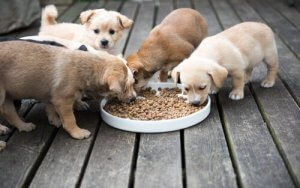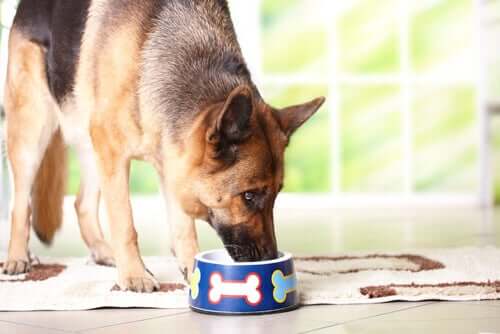The Right Nutrition for Dogs According to Their Age


Written and verified by the biotechnologist Alejandro Rodríguez
The physiological needs of many living organisms vary over the course of their lives. Among these, nutrition is one of the most important because it’s necessary for proper development. This article will offer some guidelines to help you provide the right nutrition for dogs according to their age.
Nutrition for newborn dogs
When it comes to providing proper nutrition, the newborn stage is perhaps the most vital. During the first days of life and up until 6 months, the main source of a puppy’s nutrition should be maternal milk. Aside from providing all of the necessary nutrients, maternal milk is a source of defenses and other vital components for the immune system.
On some occasions, we don’t have access to maternal milk. Perhaps the first substitute that comes to mind for feeding a newborn pup is milk, and that’s a good idea. However, it’s important to know that not all types of milk are suitable for canine consumption. Therefore, it’s best to reach for a special commercial formula. What’s more, during this stage, it’s also important to pay attention to your pup’s digestion to make sure everything is okay.
Nutrition for dogs: puppies
Once the first weeks are over, your little pet can begin to ingest solid foods. But keep in mind, it’s always best to make sure foods are soft, or moisten them in order to make digestion easier.

During this stage, the energy needs of our pets become enormous–even more so than with adult dogs. Therefore, their diet should be rich in several fundamental components. These include proteins, fats, and calcium, which will supply enough energy for puppies to grow and develop.
As for the type of nutrition, this depends on the breed and size of each animal. That being said, you can choose from special food for young dogs. You can also give them homemade foods that contain the above-mentioned nutrients, as long as they are easy to digest. Meat or rice are both good options.
Space your puppy’s food out in about three daily feedings. As your puppy grows you can go down to two or even one feeding per day. At the same time, you should keep in mind that this diet change should take place gradually.
Nutrition for adult dogs
If you feed your pet properly, he or she will develop quickly until reaching the adult stage. Here, the breed of your dog plays a decisive role. Small dogs reach maturity by the age of 12 months, while large or giant dog breeds take 15 to 24 months to reach full maturity.

When dogs reach adulthood, their nutritional requirements change, and their nourishment becomes a maintenance diet. The amount of energy they need is lower than during the puppy stage. As adult dogs, their calorie and calcium intake should decrease in order to avoid becoming overweight. However, proteins and carbohydrates should remain present in their diet.
Just as with other stages of growth, there are specialized foods for the adult stage. If you have any doubts, then the best thing you can do is consult with your veterinarian. He or she will indicate what food is best according to the breed and size of your dog. For example, for very active pets, you may be best off offering food that provides enough energy to keep them active.
Nutrition for senior dogs
This stage is associated with a series of factors. These include reduced daily activity, a lower rate of nutrient absorption, and a weakened immune system. That’s exactly why it’s very important to offer your senior dog specialized foods for this stage of life.

Senior dogs are much less active than in their youth. Therefore, they need a diet that’s low in calories and protein to avoid becoming overweight and causing liver damage. The percentage of fiber in their diet should be high in order to make digestion and defecation easier.
Another interesting point is that the dog food you choose should contain minerals and antioxidants. These will help absorb nutrients and keep their immune system stable.
The physiological needs of many living organisms vary over the course of their lives. Among these, nutrition is one of the most important because it’s necessary for proper development. This article will offer some guidelines to help you provide the right nutrition for dogs according to their age.
Nutrition for newborn dogs
When it comes to providing proper nutrition, the newborn stage is perhaps the most vital. During the first days of life and up until 6 months, the main source of a puppy’s nutrition should be maternal milk. Aside from providing all of the necessary nutrients, maternal milk is a source of defenses and other vital components for the immune system.
On some occasions, we don’t have access to maternal milk. Perhaps the first substitute that comes to mind for feeding a newborn pup is milk, and that’s a good idea. However, it’s important to know that not all types of milk are suitable for canine consumption. Therefore, it’s best to reach for a special commercial formula. What’s more, during this stage, it’s also important to pay attention to your pup’s digestion to make sure everything is okay.
Nutrition for dogs: puppies
Once the first weeks are over, your little pet can begin to ingest solid foods. But keep in mind, it’s always best to make sure foods are soft, or moisten them in order to make digestion easier.

During this stage, the energy needs of our pets become enormous–even more so than with adult dogs. Therefore, their diet should be rich in several fundamental components. These include proteins, fats, and calcium, which will supply enough energy for puppies to grow and develop.
As for the type of nutrition, this depends on the breed and size of each animal. That being said, you can choose from special food for young dogs. You can also give them homemade foods that contain the above-mentioned nutrients, as long as they are easy to digest. Meat or rice are both good options.
Space your puppy’s food out in about three daily feedings. As your puppy grows you can go down to two or even one feeding per day. At the same time, you should keep in mind that this diet change should take place gradually.
Nutrition for adult dogs
If you feed your pet properly, he or she will develop quickly until reaching the adult stage. Here, the breed of your dog plays a decisive role. Small dogs reach maturity by the age of 12 months, while large or giant dog breeds take 15 to 24 months to reach full maturity.

When dogs reach adulthood, their nutritional requirements change, and their nourishment becomes a maintenance diet. The amount of energy they need is lower than during the puppy stage. As adult dogs, their calorie and calcium intake should decrease in order to avoid becoming overweight. However, proteins and carbohydrates should remain present in their diet.
Just as with other stages of growth, there are specialized foods for the adult stage. If you have any doubts, then the best thing you can do is consult with your veterinarian. He or she will indicate what food is best according to the breed and size of your dog. For example, for very active pets, you may be best off offering food that provides enough energy to keep them active.
Nutrition for senior dogs
This stage is associated with a series of factors. These include reduced daily activity, a lower rate of nutrient absorption, and a weakened immune system. That’s exactly why it’s very important to offer your senior dog specialized foods for this stage of life.

Senior dogs are much less active than in their youth. Therefore, they need a diet that’s low in calories and protein to avoid becoming overweight and causing liver damage. The percentage of fiber in their diet should be high in order to make digestion and defecation easier.
Another interesting point is that the dog food you choose should contain minerals and antioxidants. These will help absorb nutrients and keep their immune system stable.
All cited sources were thoroughly reviewed by our team to ensure their quality, reliability, currency, and validity. The bibliography of this article was considered reliable and of academic or scientific accuracy.
- Dauvergne, C. (2018). La alimentación del perro. Parkstone International.
- Manteca, X. (2011). Nutrition and behavior in senior dogs. Topics in companion animal medicine, 26(1), 33-36.
- Wedekind, K. J., Yu, S., & Combs, G. F. (2004). The selenium requirement of the puppy. Journal of Animal Physiology and Animal Nutrition, 88(9‐10), 340-347.
This text is provided for informational purposes only and does not replace consultation with a professional. If in doubt, consult your specialist.








